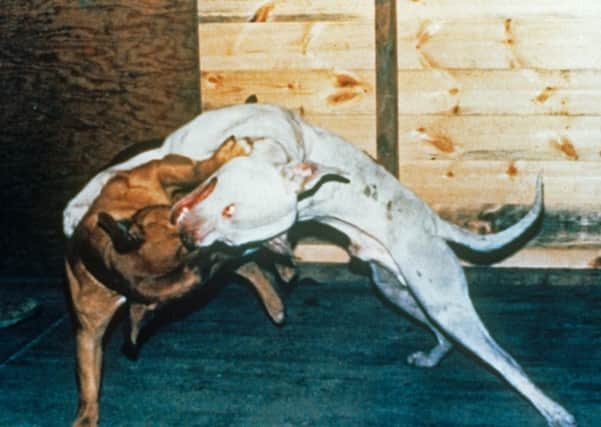Campaigners call for dog fighting penalty increase


Almost 150 calls about organised fighting were made to the RSPCA in the county since 2006, according to new figures.
But during that period there were just 137 convictions nationally, with experts fearing it is difficult to bring about prosecutions.
Advertisement
Hide AdAdvertisement
Hide AdThe maximum sentence for offenders is six months in prison and/or an unlimited fine, but campaigners want that to be increased.


Abi Sadler, animal manager at Lancashire rescue charity Animal Care, said the centre saw dozens of animals with “unexplained scars”, with some of those believed to have been used as bait, used to train fighting dogs.
She said: “It’s absolutely heartbreaking.
“They train the dog up to be as strong as possible, they do all sorts of things - in the house they will tie a rope to the ceiling so the dog jumps up and grabs it, making its neck stronger.
“Then they go on to live bait. This is where we have real concerns over social media - people selling pets over it, rabbits, kittens, guinea pigs, they are the first thing they practise on.


Advertisement
Hide AdAdvertisement
Hide Ad“Then they start practising on other dogs - it’s thrown into a ring and the dog is persuaded and encouraged to nearly kill that dog.” Abi said the dogs used could be all kinds of dogs, but were often Staffordshire Bull Terriers.
She said: “Staffies can be absolutely fantastic - it’s the person that has the lead and trains and encourages them to do this.
“They are encouraged to do it, they are not born bad, no dog is born bad.
“The ones we have had in used for dog bait have been small Staffies - they have literally been ripped to pieces and they are absolutely petrified.”
Advertisement
Hide AdAdvertisement
Hide AdAbi said, while such dogs later tended to be terrified of other dogs, they were often “forgiving” of humans and could be rehomed.
She said: “They are petrified of other dogs, so it’s about working with them teaching them not every dog they meet is going to kill them.”
Abi said animals came to Animal Care in Lancaster every week from pounds all over the North West, with about one in 10 having “unexplained scars”.
The most recent case the centre had of a dog used as bait was Staffordshire Bull Terrier Daisy, who left the centre about seven months ago.
Advertisement
Hide AdAdvertisement
Hide AdDaisy, who vets estimated was about 18 months old when she arrived, almost bled to death and was saved “just in time”, and is now in a “wonderful” new home with other dogs after being looked after at Animal Care.
Abi said dog fighting seemed to be “on the rise” and said: “I honestly don’t know why, I don’t know what goes through people’s minds to think that’s okay.” But, despite the apparent rise in cases, the number of prosecutions remains relatively low.
Abi said: “It’s finding the person that actually owns the dog. “Not every dog is chipped so it’s hard to find the owner, so there’s no one to prosecute.
“The dog is removed by the authorities and put to sleep – that’s the dog’s life.
Advertisement
Hide AdAdvertisement
Hide Ad“The owners get away scot-free and then they go on Facebook, get another dog and it’s an endless cycle.
“It’s becoming an issue that we can’t really keep an eye on.”
She urged anyone who thought a dog may be being trained to fight to contact the police, RSPCA or dog warden.
According to the data released by the RSPCA, Lancashire was the seventh highest county in the UK for calls to the charity for dog fighting with 2014 and 2015 some of the worst figures to date.
Advertisement
Hide AdAdvertisement
Hide AdIn 2014, 24 calls were made and in 2015, 19 reports were logged with the RSPCA in the county.
The charity listed Lancashire’s population as just more than 146,000 and said there were 10 reports of dog fights per 100,000 people.
Preston Council says it is no longer able to visit schools to talk about responsible ownership of dogs due to a lack of resources.
Its dog wardens now mainly focus on dog fouling and micro-chipping.
Advertisement
Hide AdAdvertisement
Hide AdA spokesman said: “Any dog deemed dangerous or that we suspected of being involved in organised fighting would be referred to the police for them to deal with.”
A Lancashire Police spokesman said: “All organised dog fighting is both cruel and illegal. If you suspect that dog fighting is taking place, contact either the police or an animal welfare organisation such as the RSPCA.
“For more information about dangerous dogs, go to the Lancashire Police website.”
RSPCA chief inspector Mike Butcher - recognised as one of Britain’s leading experts on dog fighting - said: “We need new deterrents to tackle the brutal spectacle of fighting two dogs in a pit, which continues to be an increasing problem despite it being made illegal more than 180 years ago.
Advertisement
Hide AdAdvertisement
Hide Ad“England has fallen behind other countries, including Northern Ireland, in its sentencing for dog fighting. We welcomed the announcement by the Government in 2015, that dog fighting is a serious offence and and that sentencing needs to be increased and hope they will announce measures to rectify this.
“I’ve seen footage of dogs gasping for life, covered in blood, as people encourage another dog to inflict yet more suffering upon them. Even after more than three decades investigating organised animal crime, I still find it shocking to actually think someone could gain so much pleasure from something so cruel.”
Jeremy Cooper, chief executive of the RSPCA, added: “Day in, day out, our inspectors deal with animals who have been scalded with boiling water, stabbed, shot, poisoned or forced to fight to the death. It’s absolutely heartbreaking.
“We would like to see a further review of sentencing under the Animal Welfare Act to allow magistrates to give stronger sentences to those guilty of the worst animal offences.
Advertisement
Hide AdAdvertisement
Hide Ad“This could bring sentences for animal welfare cruelty and neglect in England and Wales into line with Northern Ireland where the maximum sentence is five years in prison.”
• Contact police on 101 or the RSPCA on 0300 1234 999.